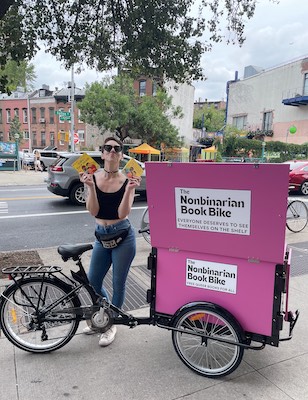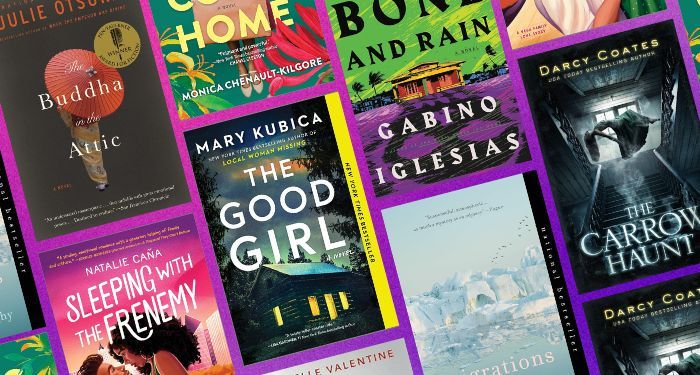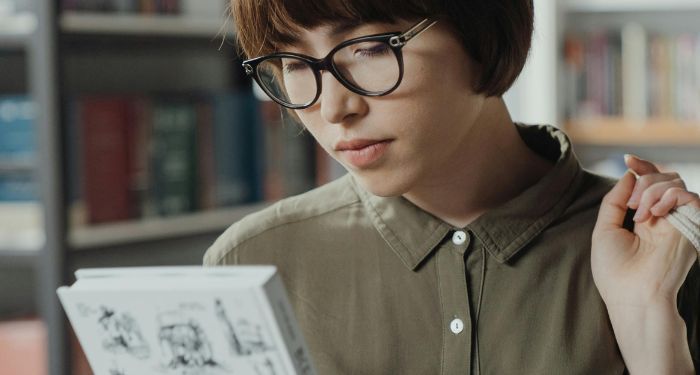The Book Bike Bringing Free, Queer Books to Brooklyn
If you live in New York, you may have spotted The Nonbinarian Book Bike. It’s hard to miss—a bicycle carrying a big, bright pink box full of free LGBTQIA+ books for all ages and languages directly to the community.

The initiative was founded by K. Kerimian, and is new on the scene; it’s only been operating in Brooklyn for a few months now. K. began the Book Bike out of the desire to continue their work bringing books to the public without the constraints of a for-profit system nor the red tape of a non-profit. Instead, they’ve focused on mutual aid—an effort for the community, by the community, that builds solidarity while getting queer books into the hands of those who need them and may not have a way to afford or discover them. At a time when book bans are becoming more ubiquitous, and the American landscape is growing increasingly hostile toward queer, trans, and QTBIPOC individuals, accessible queer literature feels more urgent than ever.
K. and I first met as coworkers at Greenlight Bookstore, where we worked together with many others on staff to create Greenlight’s union, an effort that was a stepping stone toward K.’s creation of The Nonbinarian Bike. K. and I spoke over e-mail, discussing the gender euphoria and nonprofit work that inspired The Nonbinarian’s creation, what mutual aid can do that for-profit and non-profit institutions can’t, and why straight allies need to step up to fight against book bans in red states.
Katie Robinson: What inspired you to take on this project, and what went into getting it off the ground?
K. Kerimian: Like many career booksellers, it started with the dream of owning my own bookstore. My dream bookstore had a stage for performances and readings, a studio space for workshops and classes, and a community co-working area for sharing resources. This nebulous creative haven safe space that sure as shit wouldn’t make any money. But from that vision, a few major events shaped The Nonbinarian coming to fruition:
In 2022, I received top-surgery. The first time I got to be without a shirt in public was in the Washington Square Park fountain at Dyke March during Pride. The next day, I went to [the beach at Jacob] Riis. It was the first time I had ever felt comfortable in my body—not just comfortable, but happy. One of the best decisions I have ever made.
That same summer, I was the Bookmobile Manager of Partnerships and Operations for House of SpeakEasy, which played a huge role in shaping what I wanted to see out of book distribution. If you look at our mission and theirs, you can see there’s a lot of overlap: to distribute free books in the NYC area in neighborhoods where few or no bookstores exist via mobile pop-up. But there were limitations too. Some of it was logistical (driving a 27’ box truck in the city), but some of it was structural: SpeakEasy is a 501(c)3.
Just as the bookmobile season was winding down, I celebrated my 34th birthday. See, this was the age I didn’t think I’d made it to. Something about being a trans person, especially someone who uncovered their identity later in life, that I had never allowed myself to picture a future. There just… wasn’t anything beyond 33. I’d felt that way for years. But then I made it. I reached that impossible age. And I had done so with a brand-new flat chest that made me feel gender euphoria like I had never felt. And for the first time, I could finally conceive of a future—and not just my future, but the future I wanted to see out there in the world.
And then there was this urgency to not just idly wonder “wouldn’t it be nice to own a bookstore/performance venue/community space someday” but to take action. All the limits of the bookmobile turned into answers for what I could do with my future vision instead. I wouldn’t be able to change someone else’s nonprofit overnight. But I could start something of my own. Hence, mutual aid, a bike and not a larger vehicle, a queer community focus. No one was going to hand me that dream, so fueled by gender euphoria and inspired by the bookmobile, I asked people to buy queer books from a wishlist for my 34th birthday for a new project: The Nonbinarian.
It started with a Bookshop.org page. And within those first few weeks, the entire mission, identity, the website—everything, came together. Funding for the bike was a passive strategy through affiliates, like Bonfire & Ko-Fi. The focus was really on building a community and a presence so that by the time the bike was fully funded and arrived in Brooklyn, we would already have a foundation of folks involved to hit the ground running. And that’s exactly what we did.
KR: A part of what makes the book bike so special it’s a local Brooklyn community effort, a queer community effort, and an intersectional effort, focused on “solidarity, not charity.” I’d love to hear what that means to you, and what you feel a mutual aid effort like this can do differently from other literary spaces like bookstores or libraries.
KK: There’s a legacy of mutual aid that is at the heart of a lot of movements, especially amongst marginalized communities, but one of the most notable efforts came out of the Black Panthers & the Young Lords. History classes may remember those groups for their radical politics, but both groups were responsible for many programs that have since been recreated all over the world—proof of concept is in how individuals responded to the COVID-19 crisis and how they organized collective actions for basic survival needs. I encourage folks to read more about the history of collective community care, as others have written extensively on the subject, and I cannot do it justice in a few paragraphs.
Mutual aid, as I live it, is if I have the means to show up for my comrade in need of support, then I will, trusting that when I am in need, my comrades will show up for me, too. This is not because of a debt owed to be repaid, but because of respect for relationships built on shared values, where many of us are trying to do our best, but the systems around us are failing us, and if we don’t take care of us, then who will?
Bookstores and libraries want the same things that we want—to reach new readers, to help people feel seen in a book, to build a community—but because bookstores also have to worry about the evil empire and small profit margins in publishing, and public libraries are at the whims of their state and local governments, and both have to worry about payroll and keeping the lights on, those will always have to be priorities that take precedence above ideals. But with mutual aid, you can prioritize people in a way that other literary spaces just can’t.
KR: We were both involved in Greenlight’s unionization efforts, which resulted in the store officially unionizing in 2022. It wasn’t always an easy road, but there was so much love, solidarity, organization, and tons of hard work from a lot of people that made it happen. I know for me, I was really inspired by the continuous shows of solidarity that went into that effort, and it taught me a lot about the power of collective action. Did that experience have any influence on the decision to create the book bike or in helping you see a path forward for building out a community-based mutual aid effort?
KK: Absolutely, 100%. It’s no coincidence that many former Greenlight union worker-organizers are heavily involved with The Nonbinarian.
At the point in which I started at Greenlight, organizing was underway but still sort of hush hush. I remember the first time I hung out with folks outside of work in which they all sort of turned to me in this conspiratorial way to tell me that they were organizing, like they were choosing to let me into this secret club. Those next few months of preparation were a really exciting time for us. Everyone was equally invested in this group effort to improve future working conditions. One night shortly after the march on the boss, a group of us went to queeraoke & we all sang “What’s Up” by 4 Non Blondes & it felt so fucking powerful to share a mic and belt it out.
Like many career booksellers, it started with the dream of owning my own bookstore.
That was about one year before The Nonbinarian was formed. Now, sadly, there’s very few of those original bargaining unit members left at the company. But it’s that feeling of strength in numbers, in solidarity, that I felt in those early months—instilled by the folks who preceded me who put in so much work—that keeps my faith in our union.
One of the things I say to new hires during their union orientation is that being a part of a union means we’re not just fighting for better working conditions for us in the present, but for those who come after us, and that everything we have earned was due to the labor of those who came before us. And that idea of future building is the heart of abolitionist thinking and any sort of justice work. Because it requires not just expressing dissatisfaction for the way things are, but first imagining and then executing new ways of being. That’s what the union is: future building. And in a different way, that’s very closely tied to what we [the Nonbinarian community] do too.
I just realized I became the shop steward shortly before top surgery. 2022 was a big year for some personal revolution, huh.
KR: Fighting against book bans is a part of the book bike’s mission, helping to provide LGBTQIA+ and QTBIPOC folks of all ages access to books they may not have access to otherwise. What are some ways that folks in other states—especially states where book bans are getting increasingly more severe—can start mutual aid efforts of their own to help get important, empowering books into the hands of those who need them?
KK: I speak from a seat of privilege as a New Yorker when I talk about book bans, so I first want to acknowledge that my viewpoint is from a remove.
When I attended [the American Booksellers Association] Winter Institute this past February, my favorite panel was (surprise, surprise) “Book Banning: Stores, Authors, & Communities: What Can We Do?” in which none other than Maia Kobabe, author of Genderqueer, appeared. Putting my fanboi aside for a second, it was one of the other panelists who made a lasting impression: Laura DeLaney, co-owner of Rediscovered Books in Boise, Indiana. Laura shared how the school board near her store banned 23 books, so she decided to push back. In a total badass move, Laura started handing out copies of those titles for free. Laura has stayed true to the cause, but not without risk. So when Laura spoke on that panel, it was from a deeply personal, local, and of-the-moment point of view.
I want to say more folks should respond like Laura and push back with action, I do. But I also do not take lightly the current conditions in some parts of this country. The HRC has issued a travel advisory warning of the dangers of being queer in Florida, for godsakes. I cannot in good conscience recommend actions to folks where people’s lives are quite literally at risk. As much as I would love to empower a gender nonconforming teen in Little Rock to cycle their own Nonbinarian Book Bike, more than anything I want to protect that child during this seriously scary time. But this is where allies come in.
If you are cisgender and heterosexual, and especially if you’re white, you hold keys to rooms that queer folks are not only not welcome in, but are actually warned to stay away from. Most book restrictions come from a very small but loud minority. And I think the responsibility to push back against that loud minority in particularly vulnerable regions should rest with those who hold the most privilege.
I wish my answer were more optimistic. I still encourage any version of resistance in which those books are finding their audiences. Hell, I want to get the books there myself. But the biggest efforts in the riskiest states have got to come from the people who have the least to lose if we’re going to protect queer and trans kids, so yeah. I’m calling in straight people here.
KR: How has the Brooklyn community responded to the book bike? What impacts do you hope it has had and will continue to have?
The idea of future building is the heart of abolitionist thinking and any sort of justice work.
KK: It’s been overwhelmingly positive. There have been a few times I was biking to an outing where I was at a light or something and people would hang out of their car to say “is that a book bike???” and I’d say “yup!” and then suddenly we’re having this conversation about books in the middle of traffic before parting ways. One time I stopped mid-ride because some folks wanted to know if there were actually books in there, and I wound up handing out books on the street for a couple minutes. Recently, I stopped for a moment on a ride and overheard nearby pedestrians say “OMG I follow them on Instagram!” as if it was a celebrity sighting, seeing the book bike in the wild. I’ve had people who’ve shown up to an outing because they said “I saw you biking in such and such neighborhood and it looked so cool I had to check it out.” It helps that the bike is a bright pink box, so it’s kind of hard to miss. But I love that it’s become a hyper local thing as well as an online thing. We’ve been working hard to build our Instagram presence and reach more people that way, but the work begins with our neighbors. For folks to see or hear about the bike on the street and then get to share a moment together feels a bit like magic.
The bike has only been in Brooklyn for two months. My hope is that as we continue to do the work, we’ll become a little bit more rooted, so that we’re not just some novelty passing through, but that folks may actually come to recognize us as a part of their community. My absolute dream reaction would be if The Nonbinarian Book Bike had, like, ice cream truck level of excitement. I want kids to see the bike come by and know who and what we are because they’ve had such positive experiences with us before that they’re excited to see us and to get more books from us every time.
KR: What can people who want to support the book bike do to get involved?
KK: Donate books. We will always, always, always need books.
Get the word out. This has been a crucial part of our growth as a mutual aid initiative as we are stronger in numbers & the more folks who know about us with their own networks of resources, the more likely the Nonbinarian is to survive.
Share your ideas. Is there a service you can offer? Are you a part of a community that could partner with us for an event? Do you have access to resources? Do you imagine something the book bike can do that we aren’t doing yet? Maybe your idea can make it happen (that’s actually how a lot of the Nonbinarian has developed).
KR: What do you hope is in the future for the book bike?
KK: I want to see book bikes like I see Little Free Libraries—where they just crop up & everyone is welcome to contribute & they’re just a lovely thing that exists for no other reason than to bring books to people who may not otherwise have access. You know, one cargo bike can only go so far. If there were bikes in all kinds of places just think of how many more queer people would get to see themselves in a book.






